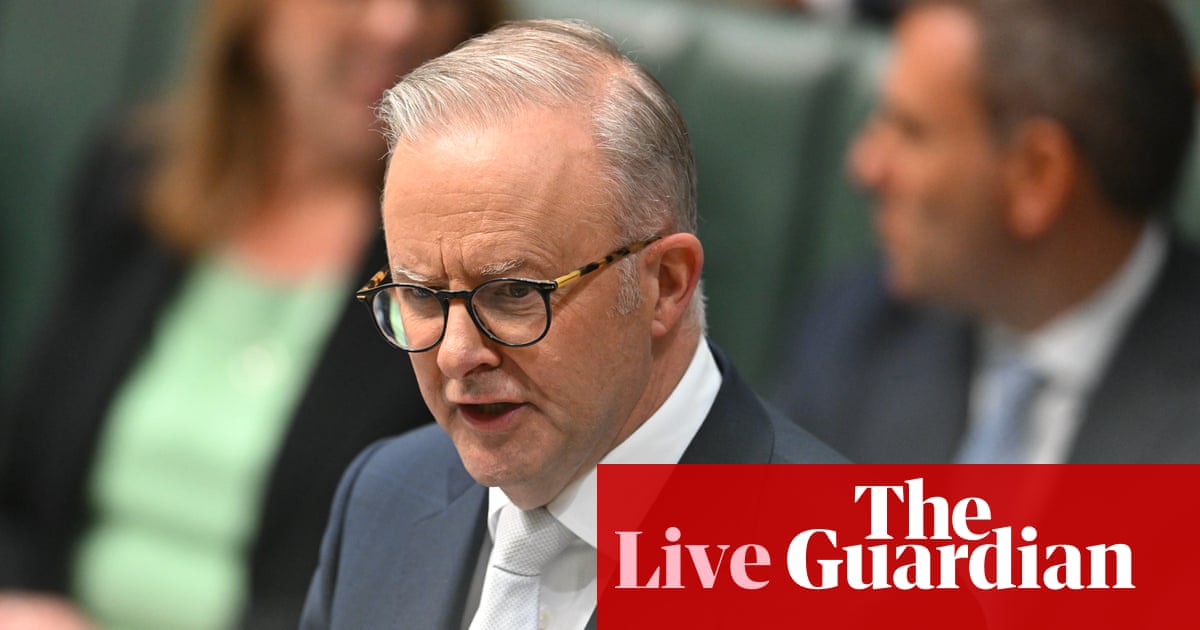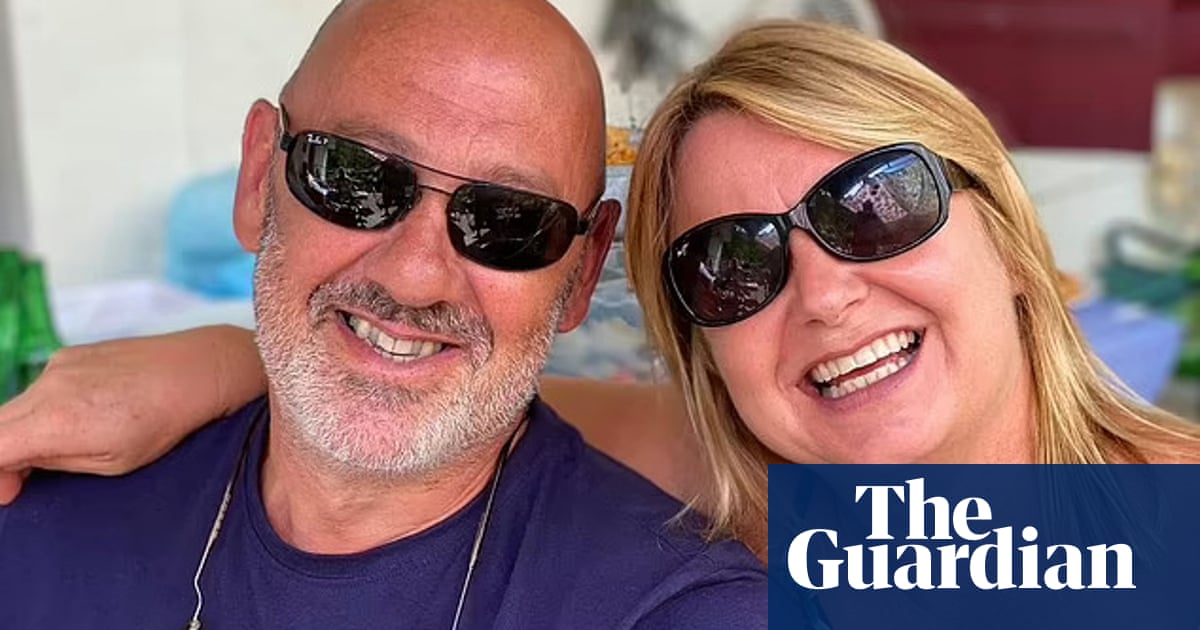Key events
Health minister Mark Butler has also been reeled into the Trump debate.
There’s not much he adds, but he reiterates the point on ABC News Breakfast, that the US and Australian economies are “deeply entwined” and that “he Prime Minister will be making that case very strongly. We’ll be batting for an exemption, and the PM will be leading that case very, very strongly.”
Butler is also asked about the inquiry One Nation senator Pauline Hanson was trying to push in the chamber last night, into transgender children. You can see more details on that from this earlier post.
Butler says he’s already commissioned a review into the clinical guidelines for trans children.
Playing politics around the health and the lives – importantly, the mental health – of some of Australia’s most vulnerable young people is, frankly, an appalling thing to do. We have issued a review by the national health medical research council which has a statutory charter to issue clinical guidelines across the health system. It’s been doing it for decades, it unarguably is the pre-eminent authority to do that.
Resources minister: outcome of Albanese-Trump call ‘very soon’
The resources minister, Madeleine King, is on RN Breakfast, saying we’ll hear about the outcome of that call between Anthony Albanese and Donald Trump “very soon”.
King also notes that not only does the US run a trade surplus with Australia, but Australia’s financial systems also heavily invest in the US through superannuation and private capital investments.
King says she has “no doubt” US and Australian officials are having in depth discussions.
The diplomatic post in Washington is among the hardest-working people I’ve ever had the pleasure to deal with, …with the former administration and now present Trump administration.
Host Sally Sara asks King whether the US is potentially using the tariff threats for something else:
The truth is we’ve worked together on other things for some time, and we’ll continue to do so, for instance, on critical minerals and rare earths. These are really important parts of new supply chains that we want to develop with the US and something multiple governments have been working on.
Indeed it was President Trump, in 2017, who signed the first executive order around securing supply chains for the US in critical minerals and rare earths, followed by another one in 2020.
Greens leader brands Trump ‘dangerous for peace’
All eyes are on Donald Trump this morning. It’s dominating the morning interviews here in parliament, with the Greens leader, Adam Bandt, weighing in, telling ABC News Breakfast, Trump is “dangerous”.
Donald Trump is dangerous – dangerous for climate, dangerous for peace, and dangerous for democracy. Today, it’s steel and aluminium, and who knows what it’s going to be tomorrow?
As Malcolm Turnbull said, you’ve got to take on the bullies – if you give them an inch, they’ll take a mile. But also, I think this shows that this is the wrong time for Australian to be joined at the hip to a country being led by Donald Trump.
Bandt took aim at the Aukus agreement. As we noted a short time ago, Australia just handed over $800m for US shipbuilding as part of the agreement with the US and the UK.

Emily Wind
Canavan: we should get ‘our own house in order’ before retaliating to US tariffs
The Nationals senator Matt Canavan just spoke with Sky News on the latest tariff announcement out of the US, labelling it a “test for the prime minister”.
Yesterday, Donald Trump told reporters he would impose tariffs on all steel and aluminium imports into the US, on top of existing metal duties. When asked which countries would be subject to the trade barriers, he replied: “Everybody.”
Asked how Australia should respond to the potential tariffs – such as through retaliatory tariffs on American imports like Canada did – Canavan said the focus should be getting “our own house in order”, arguing Australia’s safeguard mechanism was impacting the industry.
All of these facilities – the steel mills, the aluminium smelters – all of them are subject to the Labor party’s carbon tax, the so-called safeguard mechanism. So all of them have to reduce their emissions over time, and they have to pay for that …
So why would we be, on the one hand, losing our mind over an external tariff imposed on these factories, when internally ourselves, we put … similar taxes on this.
Canavan also argued that retaliatory tariffs “won’t make much difference” because Australia doesn’t import much steel from the US, and this wouldn’t be a “credible threat”.
A note here – Australia does not have a carbon tax.

Lisa Cox
Greens push for world heritage nomination for Great Australian Bight
The Greens will introduce a bill proposing to increase protections for the Great Australian Bight from oil and gas exploration.
The bill would require the federal environment minister to nominate the area off the southern coastline of Australia for consideration for world heritage status.
There are no active licences for oil and gas exploration in the Bight, which the Greens said made it the right time for such a move.
The Greens Senator for South Australia and spokesperson for the environment, Sarah Hanson-Young, said:
The Great Australian Bight is a South Australian icon with global and environmental significance worthy of world heritage status and protection from oil and gas drilling forever.
World heritage protection is a priority for South Australia and the Greens will push for it in a hung parliament.
The Albanese government has dragged its feet when it comes to supporting a world heritage nomination, despite the pleas of community, industry, and traditional owners. The Greens are acting now to force action before it’s too late.
Trade tariffs an ‘insult’: US congressman
The Democratic congressman Joe Courtney has taken to the house in the US, attacking the tariff announcement from Donald Trump. Courtney co-chairs the friends of Australia caucus, and has been an advocate of the Aukus agreement.
Courtney highlights the $800m downpayment Australia has just given the US for the Aukus submarine deal, just two days before the tariff announcement. He calls the announcement an “insult”.
Australia is a key strategic ally for our country. They are positioned in the Indo-Pacific at a place where, again, tensions are sky high and we need their input, their help in terms of making sure that we are going to rebalance that security environment and protect the rule of law and the Indo-Pacific,
Instead, what we’re seeing is a completely needless, almost, insult to the people of Australia by raising tariffs of Australian products coming into this country.
He also makes the trade surplus point – that Australia imports more from the US.
The US economy has a trade surplus with Australia. We export more into Australia than they export back to us. They have been a signatory to a trade agreement with no tariffs going back to 2002.
No ‘megaphone diplomacy’ from the government
The assistant trade minister, Tim Ayres, says there’s “a long way to go” to understand the parameters of the announcement by Donald Trump.
This morning the prime minister is scheduled to speak with US president. There has been careful messaging from Labor on not commenting or reacting to every development from the US. Speaking to ABC AM, Ayres repeated that line:
We are going to approach this in a calm and consistent way, focused on the national interest, not megaphone diplomacy, not responding to every development, or commentating on every development.
Ayres also notes Australia – since facing a diplomatic freeze with China – has worked to diversify the export market to avoid similar pressures elsewhere.
[We’ve] put effort in to at all levels, from the prime minister down, to making sure that we’ve got access to these markets. But secondly, it’s about diversifying Australia’s economy and diversifying the markets that we sell into. So diversifying the products that we sell in the markets that we sell into to make Australia more resilient.
Australian business and mining bodies weigh in US tariffs
Businesses are concerned Australian jobs and living standards are under threat from tariffs threatened by Donald Trump, Australian Associated Press reports.
With the prime minister, Anthony Albanese, already scheduled to speak to Trump later today, the Minerals Council of Australia chief executive, Tania Constable, said the proposed tariffs “set a concerning precedent”.
“Action is needed now to ensure that trade restrictions do not expand to critical minerals and other resources that are vital to Australia’s economic future and global supply chains,” she said.
Government officials have been attempting to secure an exemption for Australian exporters for months but today’s phone call will be Albanese’s first opportunity to plead Australia’s case directly to the president.
The pair have not spoken since a brief congratulatory phone call shortly after Trump’s election in November.
The Business Council of Australia also had some advice for the prime minister to help win the president over.
Free and open trade contributed to lifting Australians’ quality of life and supported one in four jobs, the BCA chief executive, Bran Black, said.
“Australia has a good story to tell – the US has a trade surplus with us and we have longstanding cultural and military ties between countries, particularly with the significant Aukus agreement,” he said.
The two nations’ military alliance was further strengthened on Saturday when Australia paid the first $800m down payment to the US as part of the Aukus deal to deliver nuclear-powered submarines to Australia.
Even if Australia fails to receive an exemption, the impacts to its economy are unlikely to be catastrophic.
The AMP chief economist, Shane Oliver, said it would be bad for Australian steel and aluminium producers but, with exports to the US at just 0.03% of Australian GDP, the macro-economic impact would be minimal.
Australian exports of iron and steel to the US valued $US237.5m ($A378.9m) in 2023, while aluminium exports valued $US316.9 m ($A505.5m), according to the United Nations Comtrade database.
The real risk to Australia’s economy came from reduced global trade, Oliver said.
Read more here:
PM should ‘play a straight bat’: Turnbull
The former prime minister Malcolm Turnbull, who got Australia carved out of Donald Trump’s previous tariffs in his first term, has weighed in on the latest tariff announcement.
Turnbull told ABC 730 last night he could see some “people are trying to set Albanese up to fail here”, but said there was a pathway.
It may be that Trump is determined to impose this tariff on every country no matter what. And, you know, in which case, it won’t be possible to secure an exemption. All the Australian prime minister can do is use all of his advocacy skills, and play a straight bat, and defend the Australian national interest.
Labor has been making the case that the US has a trade surplus with Australia, that is, that we buy more from them than they buy from us. Turnbull also seemed to think that could play in our favour.
He [Trump] doesn’t believe in comparative advantage. He believes if a country has a deficit, a trade deficit, it’s a loser. If it has a trade surplus, it’s a winner. It’s economic nonsense obviously. And but he’s believed it and he’s believed it for decades.

Natasha May
The federal health minister has made his own announcement this morning regarding increasing numbers of general practice bulk billed appointments, but concedes “we know we need to do more.”
New Medicare billing data shows since the Albanese government’s investment tripled the bulk billing incentive for children and concession card holders in November 2023 it has created an additional 6 million bulk billed GP visits – an average of 100,000 additional visits each week.
The government’s statistics show the proportion of all GP visits bulk billed has increased in all states between October 2023 and December 2024, with the largest increase of almost 7% coming in Tasmania which has consistently been shown to have some of the lowest bulk-billing rates in the country. The proportion of all GP visits bulk billed rose from 66.3% to 73.1%.
The lowest proportion of all GP visits bulk billed in December 2024 was 53.8% in the ACT, going up 2.3% from 51.5% in October 2023.
NSW and Victoria both began with the highest rates of bulk billing and saw the littlest change in percentage of visits bulk billed, going up 1.4% in the period, from 80.6% to 82% for NSW, and 76.8% to 78.2% for Victoria.
Nationally, 77.5% of all GP visits were bulk billed in December 2024, an increase of 1.9% before the investment took effect.
The health minister, Mark Butler, said:
When Peter Dutton was health minister he tried to end bulk billing with a GP tax and then started a six-year freeze to Medicare rebates that the AMA says took billions out of Medicare.”
As a government, we urgently moved to protect bulk billing for those who need to see their GP most often: pensioners, concession cardholders, and families with kids and young teenagers.”
Our investments are making a meaningful difference, but we know we need to do more to strengthen Medicare.

Krishani Dhanji
Good morning,
Krishani Dhanji here with you as we continue our way through the sitting fortnight.
It was a win for the government last night, passing its signature Future Made in Australia bill to legislate production tax credits, with some amendments from the Greens. That was after Labor moved a motion to sit longer through the night.
The prime minister will speak to Donald Trump today on a scheduled call, after the US president yesterday announced he’d be slapping 25% tariffs on all steel and aluminium imports. No doubt we’ll all be keeping a close eye out for details on that.
Put your seatbelts on, it’s going to be a big one!
GPs call to extend tripled bulk billing to young people
The government should prioritise helping Australians under 34 access bulk-billed GP appointments, make longer consults and mental health appointments cheaper, the peak body for general practitioners says.
The Royal College of General Practitioners (RACGP) launched its federal election platform today which will aim to get the bulk-billing rate back to 85% for Australians most in need it by delivering an extra 6.2 million bulk-billed GP appointments per year.
The college is calling on all parties to support the 19 initiatives it has proposed, including halving the cost of longer consults, bringing down the average out-of-pocket costs for people who aren’t bulk billed from $59 to $25 per person for appointments longer than 20 minutes.
They want mental health care with a GP to be more affordable, calling for a 25% increase to Medicare rebates for mental health consults.
They are also calling for the government to extend the tripled bulk billing incentive – which in 2023 increased the amount that GPs receive when they bulk bill children and concession card holders, to all Australians under 34 years of age.
RACGP President Dr Michael Wright said “we know young people are doing it especially tough and are more likely to have delayed care due to costs.”
The 2025 election is critical – people across Australia need urgent cost-of-living relief, including for essential healthcare.
The RACGP has a comprehensive plan that will deliver more GPs, lower patient fees, and increase bulk billing for Australia. Two initiatives are key – we need significant investment in Medicare to lower fees and increase bulk billing, and we need to train more GPs, so everyone can get the care they need, when and where they need it.
RACGP has estimated its plan would prevent 15,617 emergency department presentations and 42,168 hospitalisations saving the health system around $485.8m per year.
More than half of Coalition senators have sided with Pauline Hanson in a failed push for an inquiry into the “human cost of experimental child gender treatments”.
Just a week after Peter Dutton reportedly cautioned his colleagues against wading into culture wars ahead of the federal election, 18 opposition senators on Monday backed the One Nation leader’s motion to establish the parliamentary inquiry.
Frontbenchers Michaelia Cash, Bridget McKenzie, Jacinta Nampijinpa Price, Jonno Duniam, Perin Davey, Kerrynne Liddle, Susan McDonald and Claire Chandler were among the Coalition senators to support Hanson’s push.
The motion failed 21 votes to 36 after three Liberal senators – Andrew Bragg, Maria Kovacic and Richard Colbeck – sided with Labor, the Greens and crossbenchers David Pocock, Lidia Thorpe and Tammy Tyrrell to sink it.
Hanson’s inquiry would have come on top of a review of medical treatment for transgender children, which the health minister, Mark Butler, announced last month.
The wide-ranging terms of reference for the proposed Senate inquiry included the testimonies from individuals who have undergone puberty blockers, cross-sex hormones and surgical interventions, and the experience of families who were “pressured, misled or denied” consent in their child’s treatment.
Welcome
Good morning and welcome to our live politics blog. I’m Martin Farrer with the top overnight stories and then Krishani Dhanji will pick up the slack.
A key plank of Labor’s Future Made in Australia plan passed the Senate last night with the help of Greens and crossbenchers. The legislation will provide $13.7bn worth of tax breaks for critical minerals processing and green hydrogen production, with Anthony Albanese hoping it will give him a pre-election boost. We have more details and reaction coming up.
More than half of the Coalition’s senators sided with Pauline Hanson last night in a failed push for an inquiry into transgender children – more details in a minute.
Australian business groups say the prime minister should emphasise historic ties and the Aukus military deal when he speaks to Donald Trump later today amid the possibility of tariffs being imposed on exports to the US. More coming up.
And thousands of businesses and individuals in New South Wales were left without broadband access last night after huge storms caused a major outage for TPG, Vodafone, iiNet and Kogan. Almost 14,000 customers were affected after a power cut caused the loss of service but most were back on by mid-evening. Wild weather caused chaos in Sydney earlier in the day.
Article by:Source: Krishani Dhanji











:max_bytes(150000):strip_icc():focal(718x391:720x393)/louise-lasalle-tout-2825-c7e93a6a127e4a949029f49418004115.jpg?w=300&resize=300,180)
:max_bytes(150000):strip_icc():focal(718x391:720x393)/louise-lasalle-tout-2825-c7e93a6a127e4a949029f49418004115.jpg?w=80&resize=80,80)



